Loyola University of Chicago
1144 W. Loyola Ave.
Campion Hall Room 015
Chicago, IL 60626
Tom Galvin
Region Director
630-290-3857
tgalvin@ivcusa.org
Cathy Buescher
Program Manager
201.407.6052
cbuescher@ivcusa.org
Fr. Steve Krupa, SJ
Jesuit Chaplain
stephenkrupa17@gmail.com
Dan Hartnett, SJ
Jesuit Chaplain
dhartnettsj@gmail.com
James Sweany
Spiritual Animator
sweans@aol.com
Archive
November 2019
Gary Gardner, Chicago Jesuit Academy
 I am a volunteer tutor at Chicago Jesuit Academy, a school for boys in grades 3 through 8. The school is located in Chicago’s west side Austin neighborhood and aims to provide educational, social, and counseling support to improve chances for a student’s success in high school and college. My day consists of a combination of classroom support in a variety of subject areas and one-on-one assistance with homework and reading skills. My volunteer efforts have given me a greater appreciation of the struggles faced by inner-city youth. Although my contributions are small compared to those of teachers and staff, developing relationships with the students through academic support and encouragement is very rewarding, and makes me feel like I am making a material difference.
I am a volunteer tutor at Chicago Jesuit Academy, a school for boys in grades 3 through 8. The school is located in Chicago’s west side Austin neighborhood and aims to provide educational, social, and counseling support to improve chances for a student’s success in high school and college. My day consists of a combination of classroom support in a variety of subject areas and one-on-one assistance with homework and reading skills. My volunteer efforts have given me a greater appreciation of the struggles faced by inner-city youth. Although my contributions are small compared to those of teachers and staff, developing relationships with the students through academic support and encouragement is very rewarding, and makes me feel like I am making a material difference.
October 2019
Don Gimbel: Faith and Fellowship, Oak Park
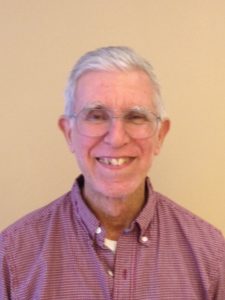
I volunteer with Faith and Fellowship, a one-woman agency that is a religious outreach to people with mental illness in residences in the west side of Chicago. We work out of the old convent of St. Catherine-St. Lucy Church in Oak Park. I lead prayer times, and for one residence, a math class, at three west side residences. I also participate in structured prayer services with residents of two facilities at the church’s old convent. For me, meeting and praying with residents is strengthening and nourishing. The deep faith of some, in the difficult circumstances of their lives, is to be deeply pondered. At one of my recent prayer services, the theme was “What is your foundation?” Everyone said that ultimately their foundation was God (or Jesus), but one said, “These Thursday meeting are my foundation. I look forward to them. I can talk about these things [his desire to move on in his life and the frustrations in trying to do this].” It is times like this that you can see God working in our lives.
September 2019
John Meade: Catholic Charities Northwest, Des Plaines

This is about my service at Catholic Charities in Des Plaines where I have served the past nine years.
My primary role is to greet people as they arrive for food from the pantry, register them if this is their initial visit, and have them sign for the food we provide.
I enjoy interfacing with clients, briefly chatting with them and giving them an encouraging word. I realize that I am not changing their lives, but I do want the kind words to give them hope for a good day and a better tomorrow. Some are embarrassed to seek food, but I assure them that we are here to assist them in whatever way we can for as long as they need help. I remind them that we all depend on others to help us through life and one should not be ashamed to be assisted by others.
I reflect what it must be like to seek food from a pantry, but I do not really know what that feels like as I have not walked in their shoes. I thank the Lord for the blessings he has given me and for the opportunity to help those in need. I often reflect on Chapter 25 of Matthew’s Gospel which says if we provide food to the least of the Lord’s people, we do it to Him.
May 2019
Donna Ioppolo: Aquinas Literacy Center, Chicago
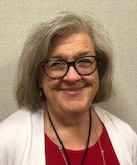
I volunteer at Aquinas Literacy Center in the McKinley Park neighborhood of Chicago two full days a week since starting in September 2018. The Aquinas Literacy Center is sponsored by the Adrian Dominican Sisters and has been serving the neighborhood since 1996.
The mission of the Aquinas Literacy Center is to empower adults by providing basic literacy and life skills through individualized tutoring, in environments that respect and reverence individuals. While the majority of the students come from Spanish-speaking countries, there is a significant number of Chinese- and Arabic-speaking students as well as some who speak a variety of other languages. Through one-on-one tutoring, supported with conversation classes, writing workshops, book clubs, computer learning opportunities, and job assistance workshops, learners are able to improve their English-language literacy and achieve their personal goals. The staff at Aquinas instruct new tutors in ESL teaching methods that have shown success over many years.
I serve as a tutor for ninety-minute weekly sessions to four women ranging in age from mid-twenties to early-sixties—three on Mondays and one on Thursdays—who are studying in three different levels of English learning. Along with basic English literacy, we talk about daily life skills such as communicating with a child’s teacher or with medical professionals for doctor’s appointments. In addition I lead a drop-in language and vocabulary class on Thursday mornings attended by as many as twelve students. I often can use my experience in library work to direct students to additional sources of English language learning. Many of the students have completed high school in their home countries and some have college credit; it is their English language skills that hold them back from finding meaningful work.
An unexpected addition to my direct work with individuals has been the growing knowledge of some of the poorer areas of Cicero and Chicago which I encounter on my travel to and from Aquinas. I have learned to see with new eyes men and women who sleep outdoors overnight, those who are living on the streets looking for food, and many who do not have any of the advantages of living in a modern, urban environment. I am humbled by my inability to find solutions to everyone’s problems, and use my commute as a time of deep reflection and prayer for all of the disadvantaged people in our communities.
March 2019
Mary Claytor: Family Focus, Aurora

I volunteer at Family Focus in Aurora. It is a Chicago based non-profit dedicated to supporting and strengthening families in and with their communities. Some of the programs offered are early childhood home visitation, parenting classes, after school programming, ESL classes, and immigration services. I work with DACA clients, provide mentoring to the after-school program and am laying the foundation to start an ESL class.
I am amazed at the spirit of the people who walk through the door. They have so many obstacles in their path, yet they keep trying for a better life for themselves and their children. Their hope is palpable.
The staff truly love what they do. They are committed to showing compassion to every person. Their patience and kindness overwhelm me at times. No matter the request, they try to help make life easier for another.
February 2019
Bill Kniest: Captain James A. Lovell Federal Health Care Center, Waukegan
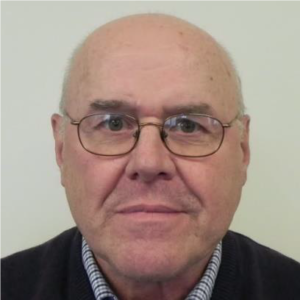
My volunteer site is at the James Lovell Federal Health Care Center in North Chicago. It is the only federal health care center in the country and is comprised of the North Chicago VA Hospital and the medical facilities for the Great Lakes Naval Base. I assist vets with the VA’s online personal health record known as My Healthe Vet. which helps the veteran in managing their healthcare. Registration, instruction on navigating the site, and helping recall user ID’s and passwords are part of the duties that fall under this assignment.
When I started at Lovell, I wasn’t sure about my assignment, and then I stumbled upon St Alphonsus Rodriguez, SJ. He was a Jesuit brother and door keeper at a college in Spain for 45 years in the early 17th Century. He experienced many trials during this time, but whenever someone knocked on the door he would reply “I’m coming, Jesus.” I have come to see that although it is not “heroic,” what I’m doing does help people.
Recently, the position has evolved into a sort of concierge service where we assist whoever comes to the desk in finding who or what they’re looking for in the hospital. My Healthe Vet is still our main purpose. But irregardless of the duties in the past six-and-a-half years I am always challenged to see Christ in others.
January 2019
Michael McGillicuddy: Kolbe House Jail Ministry, Chicago
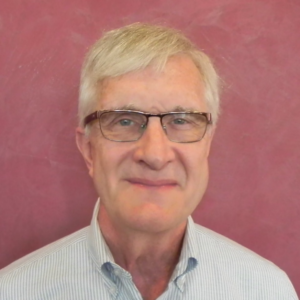
Compelled by the Gospel mandate, “I was in prison and you visited me,” Kolbe House is a sanctuary for those impacted by incarceration seeking to promote restoration and reconciliation through outreach, support and accompaniment. We follow the example of St. Maximilian Kolbe to love and hope in the midst of evil and despair. Through this ministry, the merciful love of the Father is shared…
…with the incarcerated, whom we serve as God’s beloved daughters and sons.
…with their families, to surround them with love and let them know they are not alone.
…with community members, to help see how we are all connected and affected by
incarceration.
…with the larger culture, inviting all to see in the incarcerated our own brothers and sisters.
As one of two Ignatian Volunteers at Kolbe House, I serve in various capacities. I network with other organizations whose mission overlaps with Kolbe House’s mission, accompany individuals during the critical early months after their release from detention or incarceration, accompany family members during the stressful period when their loved one is under criminal justice control, conduct groups within Cook County Jail, and manage Kolbe House’ food pantry. In all these tasks, my hope is to be a presence available to listen without judgment and share the Good News that God has plans to give each person a hope and a future.
December 2018
Frani Luehrs: Youth Connection Charter School, Chicago
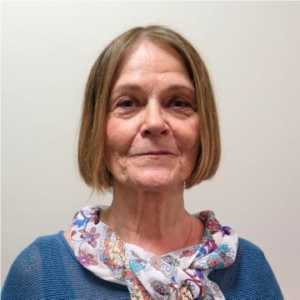
I volunteer at Innovations High School of the YCCS (Youth Connection Charter School) as a mentor/tutor in World Literature and Senior Portfolio classes. The school is focused on providing the skills and knowledge to young people, who have dropped out of the education system because of unfortunate circumstances, to obtain a high school diploma. These students, average age 18, are committed to graduating and finding a place in college or in a job. Their area of interest is in the creative arts as is mine!
I find being open in accepting them where they are allows me to honor them and help them build on their skills and express themselves. They share freely then and that opens me up to do so, too. Barriers seem to fall at times so all of our “light” shines for the moment. I know that will allow us to see one another, and in the future others, as similar in our quest for joy and happiness.
November 2018
Jim McLaughlin: Hesed House, Aurora
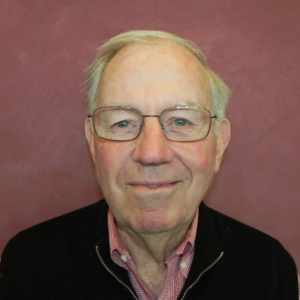
I volunteer at the Hesed House, a homeless shelter in Aurora. It is the second largest homeless shelter in Illinois. I volunteer three days a week in the mornings. I have worked in a variety of areas in the shelter, but now work all three days as a receptionist at their two locations.
I have been exposed to all types of people who have been less fortunate than myself. They are not able to enjoy the same comforts of life or freedom that I do. There is no one stereotype of person who makes up the guests at the Hesed House; they are all God’s creatures.
I choose this assignment because all the people who make up the staff are committed to showing compassion to the needs of the homeless and doing it in a manner that promotes dignity to every person who walks through their door.
October 2018
Domenica Moroney: Catalyst Circle Rock Charter School, Chicago
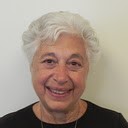
The setting is an inner-city public grade school. The volunteer tutor team, headed by two long-time teaching nuns, includes three IVC volunteers and others as well. We sit one-on-one with students drawn by the nuns from various classrooms. The focus is usually on words or numbers, depending on the individual need or assignment. Sometimes we play card games to learn math or letters and words. The kids love football math.
The privilege of working with these charming children is a great blessing of my life. The scholars are eager, appreciative, and cooperative, and it is easy to work with them. Now and then we volunteers learn about some of the less-than-ideal circumstances of their lives, and marvel at how they cope.
Some comments I’ve heard that make me want to cry:
- I don’t have my own blanket.
- My daddy’s in prison now.
- My brother’s friend was shot last week.
- I have brothers and sisters but we don’t all live together.
Being on the receiving end of their affection is the best part of interacting with the students at Circle Rock Catalyst School. The students are eager to offer hugs, sometimes rushing to choose a favorite tutor, and they make me glad I’ve shown up that day. It’s a huge reward for a small effort.
June 2018
Keith Schoenberger: Cristo Rey St. Martin College Prep High School, Waukegan
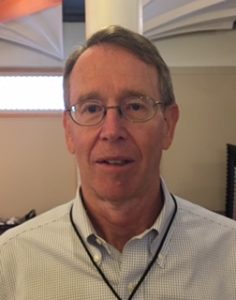
My work site is Cristo Rey St. Martin College Prep High School (CRSM), Waukegan. Like other Cristo Rey high schools, CRSM gives low income students the opportunity to pay a large portion of their tuition by working five days per month during the school year. Students also learn how to become a productive worker in a large organization.
My job at CRSM is to support the Director and the four Coordinators who manage the Corporate Work Study Program. These five dedicated women not only find jobs for 400+ students, oversee the daily transportation of students to and from their jobsites, and manage the placement of students in appropriate jobs, but also educate student-workers in how to grow personally and intellectually from their work experience. For example, students must write, and receive a grade for completing, a “time card” describing each day’s work experience. I review time card submissions and grade them each week. Sophomores who have trouble completing their time cards review them with me after work and talk about their work day. Other tasks include: meeting regularly with a student who lost his job to build habits for success in his next job; and helping students during Work Study’s “professional development” days and on projects such as resume writing.
My days at CRSM are always a pleasure (the staff and the students) and often a challenge (the paper work). On a deeper level, helping students to understand the value of thinking about their work day as they prepare their time cards for review by their work supervisors and Work Study made me reflect on the similarity between a Cristo Rey student’s time card and the Daily Examen. Just as young students are encouraged to reflect on what they learned during a day’s work and how they can apply what they learned, so too am I encouraged to use the Examen to reflect on how to follow the way of Christ tomorrow better than I did today.
April/May 2018
Mick Basila: St. Margaret of Scotland School, Chicago
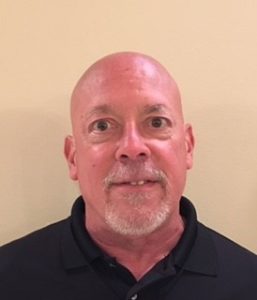
I volunteer two days per week at St. Margaret of Scotland School. The parish is some 140 years old and has undergone many changes over the decades. SMOS is predominantly African-American, servicing grades Pre-k through 8th grade. There are 235 students and in the 2017-2018 school year, 85 are new to SMOS.
The other IVC volunteer and I monitor the library, helping students with their reading, math, and science assignments. We also monitor one class in the computer lab. This year is a transition for the IVC program at SMOS. We are working to change the focus of our work from monitoring the students to tutoring those students most in need of help. When we can help students master new concepts and material, the volunteer role is very rewarding.
I have come to understand how critical education is to address the issue of economic inequality. SMOS students come from a variety of back grounds and most have to overcome economic and cultural issues to be able to achieve their education potential. My job is to enable that achievement any way I can.
March 2018
Joan Dixey: The Julia Center, Chicago
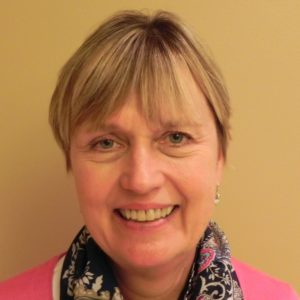
During the past four and a half years as a member of the Ignatian Volunteer Corps, I have been an English as a Second Language teacher at The Julia Center, a small community center in the West Town neighborhood of Chicago. The Julia Center serves mostly (but not exclusively) immigrant Hispanic women. Our students learn English there, but many of them also find The Julia Center to be a place that offers friendship, acceptance, and other learning opportunities.
When I first thought about joining IVC, I was both drawn to and a little intimidated by the spiritual component. I’m Catholic, but I hadn’t really delved into a deeper spiritual life aside from Sunday Mass and occasional programs offered by my parish. As my spiritual reflector pointed out, IVC and our monthly meetings, discussions, speakers, and readings are what feed my soul. In contemplating our themes of social justice, Ignatian spirituality, and contemporary theology, I have a more certain idea of what kind of Catholic I believe I should be. I’m grateful to The Julia Center and IVC for the opportunity to practice my faith through service.
February 2018
Susan Carsello: Cristo Rey St. Martin High School, Waukegan
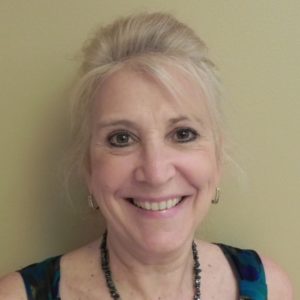
I am a volunteer at Cristo Rey St. Martin High School in Waukegan. The Cristo Rey model is very innovative – it is the only network of high schools in the country that integrate four years of rigorous college preparatory academics with four years of professional work experience through the Corporate Work Study Program. The Cristo Rey Network delivers a powerful approach to inner-city education that equips students from economically-disadvantaged families with the knowledge, character, and skills to transform their lives.
I serve as a mentor in the Corporate Work Study Program to help guide the students in how they should conduct themselves in the business world, and I also try to pass along various life skills. My husband and I have raised two boys who are now in their early 20s, and I have over 35 years in the business world. Hopefully, what I have learned over the years helps me bring wisdom and life skills to the students I mentor.
I am fortunate to connect with the students individually, and work with a staff of committed, talented, and very generous people. I feel the work is the perfect mix of using my gifts to benefit the students and the program. It has been a very rewarding experience. For as much as I have given, I feel as if I have gotten much more in return.
January 2018
Mike Philipp: Maryville Crisis Nursery
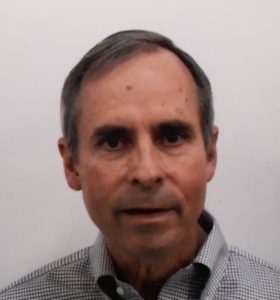
Maryville Crisis Nursery (MCN) is a temporary emergency Child Care Center serving children, birth to six years of age. Located in the northwest side of Chicago, MCN provides safe, nurturing overnight child care as well as services to families which include education, resource referral, counseling, and peer support. The program actively addresses the physical, emotional, social, and intellectual needs of children as it also works to strengthen the skills of the parents. This year I have had the good fortune to serve in several capacities. I join the child care staff in providing nurturing care and enriched stimulation of children during daytime programming. Utilizing my professional skills, I coach, encourage, and facilitate the professional development of child care workers and family care counselors. This work is a continuous opportunity to respond to the socio-emotional needs of less advantaged children and families in ways that build their individual and family skills, stability, and resilience. It is an opportunity to live the corporal works of mercy and the two greatest commandments while contributing to a safer, more loving world community. The experience enriches all of us.
December 2017
Chuck Malatesta: Habitat for Humanity
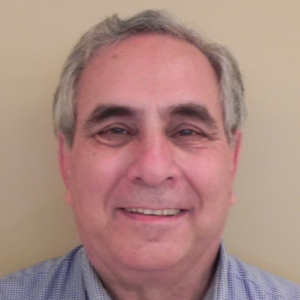
As an IVC volunteer, I have been serving at Habitat for Humanity for the past three years. I work on Tuesdays at Habitat’s headquarters on Cermak Road and Carpenter Street. There, I do paperwork for the construction manager and the Construction Department. On Thursdays, I work at the construction job site which is on Union Avenue between 119th and 120th Streets. At the site, I do whatever physical construction work I am asked to do — building a wooden gate or porch, tiling the walls of a bathroom, cutting plywood sheets for the roof of a house, wiring up the doorbell system for a house, etc. Some of the disorganization at the site can be frustrating, but I understand that my role is to support and serve rather than lead. I try to focus on the mission of Habitat and I find it very rewarding to work alongside the potential homeowners who are fulfilling the sweat equity work that Habitat requires of them.
November 2017
Mark A.: Ignatian Spirituality Project
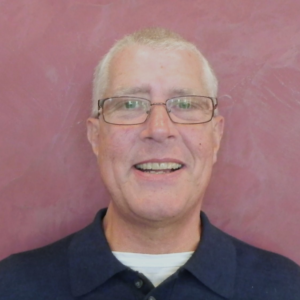
I currently serve as the men’s retreat coordinator for the Ignatian Spirituality Project (ISP.) This is a national ministry (30 cities) founded in 1998 in Chicago by Father Bill Creed, SJ. We offer spiritual retreats, days of reflection and faith-sharing opportunities to women and men who are experiencing homelessness, and many of whom are in recovery from various addictions. Many of these persons have suffered physical and emotional trauma. I encourage the men to tell their stories; that in itself can be healing and some sense of inner peace. For me, it is a form of accompaniment, and to show my solidarity with their lived experience. I find that these men are really not as different as I had imagined. Each of us has a desire to be loved; a desire to have our life experience validated, simply by listening. We all come together broken, and in need of God’s healing in our lives. Prior to my assignment here, I would have said, “someone needs to fix this…” Now I ask myself, “how can I be a catalyst for change… how can I love more tenderly?”
Spring 2016
Seeking the Magis
by Mike Galbreath
Learning more about Ignatian spirituality and a desire to become closer to God were why Joan Brennan joined the Ignatian Volunteer Corps (IVC) last September. Though new to our program, Joan is no stranger to service in the Jesuit tradition. For the past 14 years, Joan has volunteered as a part-time school counselor at Cristo Rey Jesuit High School, where she continues to serve in her role as an Ignatian Volunteer. Recently, she shared some of her unique journey with us.
“Ruined for Life”
Joan is the first IVC Chicago volunteer who was also a member of the Jesuit Volunteer Corps (JVC). Soon after graduating from Marquette University with a nursing degree, Joan joined JVC for a year where she served at a women’s shelter in Kansas City while living in community with other volunteers. “We had an introduction to Jesuit spirituality and a few retreats. It was a very good experience for a young person. The JVC has an expression: ‘Ruined for life!’ which they use, in a joking way, to refer to alums of the program. I often think of JVC Kansas City as the place where a seed was planted in me to serve others as I continue to grow in my relationship with God.” Prior to her JVC service, Joan completed a master’s degree in counseling from Villanova University, and later went on to pursue certification as a school psychologist through Loyola University Chicago.
Cristo Rey
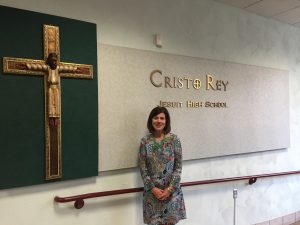
Joan at Cristo Rey Jesuit High School
Fifteen years ago, while attending a Christmas dinner she had a casual conversation with Patricia Garrity, the principal of the then-new Cristo Rey Jesuit High School in Pilsen. Ms. Garrity shared about this unique school and mentioned that the priest who had been serving as the full-time school counselor was in need of help. Coincidentally, Joan had begun to think about returning to her counseling career as her children were growing up and she was feeling a need to extend herself again. Joan offered to “fill-in as a volunteer” and she has not stopped since.
Over the years, Cristo Rey has added two other full-time counselors so that all 550 students have an assigned counselor who meets students based on each student’s unique need. Joan averages ten individual counseling sessions each school day and often maintains the same students on her caseload throughout their four years in high school. Joan explains that many of the Cristo Rey students she works with live at or close to the poverty level and often face community concerns such as gangs and street violence.
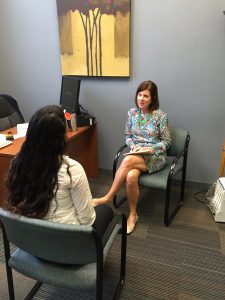
Meeting with a student
“I have a caseload of sixty-five students. Our students are like most adolescents in their fears, anxieties, and their need to feel loved, have friends and to be included. Daily, I see a lot of pain. But I also see the incredible giving our students want to do and their generosity. The beauty of working with students from Cristo Rey is the school promotes students helping others as part of the community service curriculum. Our students are always overlooking their own concerns and reaching out to others. Much of my role is to listen, understand, help and encourage them. I can clearly see God in the middle of this. I am always praying for God’s guidance and asking for help so I can best direct them.”
Why IVC?
“I first learned about the Ignatian Volunteer Corps from the parish bulletin at St. Issac Jogues Church in Hinsdale and talking about it with IVC volunteers who are also members of our church community. I often thought through counseling and the other volunteer work I had done that I was already working in some spiritual ways by helping others. But after praying about it, I saw IVC as a way to help me develop a deeper, more personal relationship with God. In my first year in IVC and especially with the help of my spiritual reflector, Fr. Mark Henninger, SJ, I feel I can better see God in everything I do, and especially in working with the kids.”
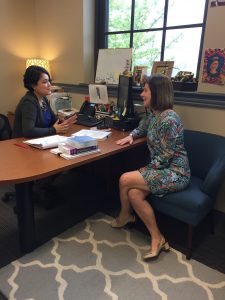
Talking with a colleague
Through IVC, Joan has been reintroduced to Ignatian spirituality including praying the Examen, the Principle and Foundation, and the use of imagination in prayer. “Some of these ways of praying are new to me. I had heard about Ignatian prayer from other volunteers, but the reflection sessions during our meetings have helped me to experience them firsthand. It is all very deliberate and centered. In my next reflection session with Fr. Henninger, I hope to further discuss imaginative prayer.”
When asked to elaborate on the connection between her faith and service work, Joan explained, “This year, with IVC I feel God’s guidance is helping me better do my work as a counselor. I have always been faith-based in my approach to counseling. I now feel stronger in my interactions with other school staff. I work with many great counselors and teachers and I now feel even more energized. My counseling work at Cristo Rey ties in so well with IVC’s spiritual formation program. IVC has added a community component with monthly meetings with other volunteers, monthly meetings with my reflector Fr. Henninger, and recommended reading. Soon, we will be wrapping up the year with the annual IVC retreat. All of this creates a very powerful sense of God’s presence that not only helps guide my counseling but also enriches my life.”
February 2016
Building Relationships in Service
It’s an incredibly challenging world for most adults with intellectual and developmental disabilities (IDD).
They’ve outgrown federally mandated public schooling which expires at age 22. There’s not even part-time work for 80 percent. And, typically, there’s little social contact outside of family and a few neighbors. Numerous problems such as depression, loss of skill sets and obesity can develop as a result of the isolation that many experience. However, being included in the local community through volunteer work can help adults with IDD gain a sense of pride and self-esteem while sharpening everyday life skills and developing meaningful friendships.
Helping provide opportunities for “inclusion through volunteerism” for adults with IDD are two first year Ignatian Volunteer Corps members: Maureen Kennedy Barney and Susan McHugh. Susan and Maureen are lead program coordinators for the Trinity Volunteer Corps (TVC). Maureen serves at Old St. Patrick’s Church in downtown Chicago where the TVC main office is located, while Susan volunteers at their Dominican University location. In addition, both Susan and Maureen help with a variety of occasional TVC special events that strengthen the goals of nonprofit organizations throughout the Chicago region.
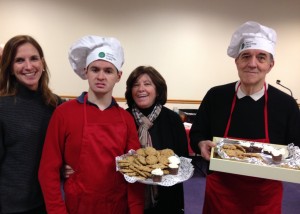
Ignatian & Trinity Volunteers Serve Together
As an Ignatian Volunteer serving with TVC two days per week, Susan coordinates undergraduate interns and establishes service opportunities for adults with disabilities known as Trinity Volunteers. “At Dominican University we match Trinity Volunteers with Dominican students—usually psychology majors preparing to work professionally in Occupational Therapy. These Trinity Volunteer-student teams perform a number of tasks around campus such as washing tables in the university cafeteria, scanning documents in the archives, dusting books in the library and gardening outdoors and in the university’s greenhouse. They are also working off campus supporting the mission of community charitable organizations such as the Oak Park River Forest Food Pantry.”
Susan uses her networking skills developed over years of service in her community to improve the experience of all stakeholders in this program. For example, last fall she brought in a member of the Rush Hospital Occupational Therapy graduate school faculty to speak to her Dominican undergraduates about next steps in their training. “These kinds of connections are especially important to our TVC interns who are often the first in their families to attend college,” said Susan. “They can really benefit from this type of insight and guidance on post-graduate opportunities.”
It’s equally beneficial to Trinity Volunteers and their families. According to Susan Finn, a member of the TVC Board of Directors and mother of Trinity Volunteer Jackie Finn, “It is amazing to watch the relationships and personal development of both our Trinity Volunteers and their partner students. The university students are learning professional skills in working with individuals who have different learning styles and abilities and Trinity Volunteers like Jackie are having an amazing experience as part of the university community.”
Working out of Old St. Patrick’s Church in Chicago’s West Loop, Maureen helps coordinate partner volunteering opportunities for 17 Trinity Volunteers some of whom work three days per week in places like the Little Company of Mary Hospital kitchen and others who work only once or twice a year assisting with special events.
“We try to work with each individual Trinity Volunteer and his or her family according to specific needs, interests and desires,” say Marty Kenahan and Greg Hunt, two of the founders of Trinity Volunteer Corps who have siblings born with Down Syndrome. “We realize from our own family experiences that some prospective Trinity Volunteers are limited by the disabilities with which they happen to have been born, and by things as mundane as transportation concerns and other challenges, but we like to dream big and ask what type of volunteer work would most delight him or her then do our best to make that happen.”
One individual dreamed of continuing her involvement in high school theater productions and through TVC is now a member of the Chicago Saints, an organization that provides volunteer ushers for local theaters. Another Trinity Volunteer longed to work with young children and, with the help of a partner volunteer, now offers presentations in nearby preschools about living with disabilities. This is part of a “Machines that Help” curriculum unit where the children see and learn about a Trinity Volunteer’s unique wheelchair and all it enables her to do within the life of the community. As Marty comments, “our hope is that the little ones will subsequently learn that there’s no need to be afraid of people who use wheelchairs.”
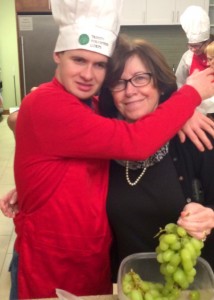
Maureen & Trinity Volunteer
Among the many projects that benefit from Trinity Volunteers’ service are the 25 local, national and international Old St. Pat’s outreach organizations as well as the Old St. Patrick’s Church community itself. Trinity Volunteers and their partner volunteers, under the direction of Maureen Kennedy Barney, staff the reception desk at the parish’s Center for Social Concerns on Wednesdays.
Maureen’s troop of volunteers not only provide a warm welcome to the Center but, between buzzing in guests, they accomplish critical tasks that contribute to the success of various Old St. Pat’s Outreach projects. “Our Trinity Volunteers are particularly good at assembly line type work so they do a great job every week of creating food bags that are distributed from the OSP Security Desk to people experiencing homelessness,” says Maureen. “They are also a very steady workforce throughout the year preparing over 4,000 ornaments for the OSP Giving Tree that collects Christmas gifts for people served by the church’s outreach programs.”
Maureen has helped to plan and execute family oriented events at the six Chicago area Ronald McDonald Houses. She and her crew of volunteers, both with and without disabilities, prepared and served dinners that nourished families staying in the houses while their children are treated for serious illnesses in nearby hospitals. After the family meals, her crew decorated the houses and set up “valentine making stations” where residents could make old- fashioned valentines and relax awhile amidst the serious issues facing the young hospitalized children and their families.
Maureen finds true satisfaction and meaning in her service. “The TVC Valentine Cheer Project at the Ronald McDonald Houses is my favorite TVC program,” she said. “It is so beautiful to be part of a program which helps families to be happily and fully engaged with their child during a traumatic time filled with many concerns about the child’s health outcomes. These evenings have been very special.”
Maureen and Susan are both assisting with plans for the upcoming TVC Feed Our Community Day where over 300 volunteers will come together at Dominican University to create 50,000 shelf stable macaroni and cheese meals to give to local food pantries.
The relationships that Susan McHugh has developed on campus have been essential to the success of this project. She and her Trinity Volunteers and their student interns recently helped recruit over 100 Dominican University students through the DU Volunteer Fair known as “The Spring Expo.”
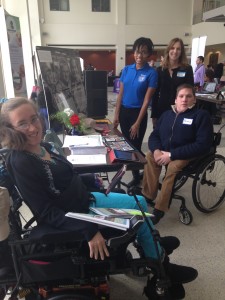
Trinity Volunteers with Susan and DU intern
At the same time, Maureen was busy organizing partner volunteers from the larger community. She built on her creative, high energy skills as a former college recruiter when she invited Blue Cross/Blue Shield of Illinois employees to participate in Feed Our Community Day.
Several months ago, Maureen, along with three of her Trinity Volunteers, presented a program about this unique partner volunteering opportunity to BCBS employees. “Our Trinity Volunteers served homemade cookies to potential BCBS program volunteers and told them all about how great the project was last year and now there are a couple dozen planning to participate,” says Maureen. “We are delighted to have their involvement and to strengthen the BCBS ties to TVC which was recently named an official Blue Cross Blue Shield Community Partner!”
Programs like the Trinity Volunteer Corps that focus on inclusion and community building are critical to adults with disabilities who want to be with other people, enjoy all of life, and be of service to others. The goal is to offer Trinity Volunteers meaningful activities at least once a week. Sometimes they can do more than that. “TVC is not a full service, highly funded program. We do what we can with what we have in limited funds and with the help of our wonderful community facilitators,” said Marty Kenahan. “Ignatian Volunteers Maureen Kennedy Barney and Susan McHugh have helped us tremendously this year and we are most grateful.”
Maureen and Susan also expressed gratitude for their service with TVC through the Ignatian Volunteer Corps. As Susan commented, in reflecting on the deeper meaning of her service: “The opportunity to work with Trinity Volunteer Corps has given me a greater appreciation of the value of individual differences. It is another level of diversity and acceptance of others–seeing God in all that we do in our connections with others.”
November 2015
Shedding Light in the Dark
By Mike Galbreath
Dark. Pitch black. No power. No lights. Basement waters now four inches and rising… Days and days of winter rains and melting snows. Is this why I volunteered? Slipping face-down into the dark, oily water. Nothing to pull me up. Am I gonna drown in this basement pond? Time once again to pray to St. Joseph… Somehow I find a pole to grab and hear J.J. call over to me to hang on. After a few long moments I am finally able to grasp something, rise up and hand J.J. the switches and tools so he can restart the electrical system.
Mission accomplished. Power on. A grateful elderly lady.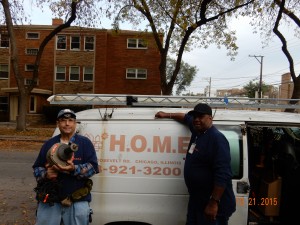
For a few moments one day last winter, it seemed like purgatory in Chicago for IVC volunteer Ken Campagna as he assisted H.O.M.E. staff member J.J. Haley. That day, they successfully returned electrical power to a low-income widow’s Chicago home—as they have done for numerous elderly persons over the last four years.
Two full days each week, Ken serves as a repairman’s assistant with H.O.M.E., Housing Opportunities & Maintenance for the Elderly. The home-repair program, just one of the many programs of H.O.M.E., is a way to help low-income elderly persons remain in their own homes as long as possible by providing basic, necessary home repairs they otherwise could not afford. Most of the assistance Ken and J.J. and the other H.OM.E. repairmen provide includes plumbing repairs as well as needed work in electrical pumps and devices for hot water, air conditioning and heating.
Ken finds his volunteering with H.O.M.E. to be very fulfilling. “It can be a hard job but at the end of each day it is always rewarding. You help older people who are usually living alone acquire needed light and warmth especially with winter approaching. J.J. and I are helping these elderly people meet their basic needs.” In our conversations, Ken also shared a deeper reason for volunteering: showing God’s love to those he serves through H.O.M.E. “People cannot be open to learning about a loving God unless they have a feeling of security. When we arrive at jobs, I have often heard clients wonder aloud about how there can be a good and loving God when they are living alone in a dark, bad-smelling, musty and cold house. ‘If my family is gone and there’s no one to help me, how can there be a God who cares about me…?’ I don’t evangelize with our clients, although sometimes I answer their questions about my role in IVC and religious concerns. People seem to have more faith in God once they have electrical power and renewed light.”
Twenty years ago, the tragic heat disaster of July 1995 killed 750 Chicagoans—mainly elderly persons living alone who had no electrical power and thus no air conditioning or running water. During a 30-hour period, air temperatures averaged 106 degrees with a heat-humidity index mean of 128 degrees. A 1996 City of Chicago formal report on the disaster concluded that the incredibly high numbers of deaths among the elderly were due to a combination of non-working electrical devices and long-neglected home repairs. Further, these elderly men and women had no social or family network to offer assistance or provide well-being visits.
H.O.M.E. and community-based programs like Little Brothers of the Elderly and Caring Connections for Seniors (also IVC service partners) today provide much-needed assistance to hundreds of low-income and isolated elderly Chicagoans. Last year, H.O.M.E. completed 773 repairs in 256 Chicago housing units. The total repair cost is only a $25 service fee and materials costs, and all labor is at no cost. The H.O.M.E. program also provides trust-worthy, helpful services in the areas of window winterization, shopping buses for seniors with limited mobility to access groceries, pharmacies and medical services, senior H.O.M.E. residences, and much more.
The Ignatian Volunteer Corps has partnered with the H.O.M.E. home-repair program for the past 8 years, providing an extra set of hands to repairmen, mostly on Chicago’s south side. Previous IVC volunteers include Dave Kelly, Tony Mahowald and Chuck Malatesta. The partnership has been a unique and mutually rewarding one for both organizations, providing needed hands-on assistance, as well as the opportunity for IVC volunteers to find God’s spirit in their service experiences.
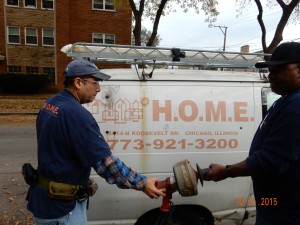 “In this work, you often have pleasant surprises,” Ken recalled. “One lady who needed home electrical repairs had just written a book on spirituality. Her main message—while living in poverty her whole life—was when you are given lemons you make lemonade. She gave me an autographed copy of her hardback book. I continue to learn to re-read parts of the book and her wisdom from it. The gratitude from people is humbling. We have many clients who’ve had their utilities turned off because of lack of utility bill payments. You cannot believe how appreciative most people are when we return their homes to livable temperatures and running water. One woman for whom we recently provided repairs had her utilities shut down for four years. How she survived in that closed-up home is amazing.”
“In this work, you often have pleasant surprises,” Ken recalled. “One lady who needed home electrical repairs had just written a book on spirituality. Her main message—while living in poverty her whole life—was when you are given lemons you make lemonade. She gave me an autographed copy of her hardback book. I continue to learn to re-read parts of the book and her wisdom from it. The gratitude from people is humbling. We have many clients who’ve had their utilities turned off because of lack of utility bill payments. You cannot believe how appreciative most people are when we return their homes to livable temperatures and running water. One woman for whom we recently provided repairs had her utilities shut down for four years. How she survived in that closed-up home is amazing.”
Ken’s and his wife Norma (also an IVC member currently on hiatus) have one adult daughter. When their daughter was born, Ken began praying to St. Joseph as the patron saint of fathers. Today, many years later, Ken continues to pray to St. Joseph who is also the patron saint of workers. Following the example of St. Joseph, it is clear that Ken and J.J.’s work is not just a service to others, but a ministry. One can visualize 2,000 years ago a poor, elderly widow coming to St. Joseph and his apprentice Jesus and requesting repairs of a water-damaged doorway, an unstable table or broken chair. Ken and J.J. are the contemporary disciples of that Biblical team offering no cost, friendly assistance to help meet the basic life needs of neighbors who have no money and few options.
“A person’s home is a sacred place,” said Ken.” If a person’s sacred place fills the person with depression, it makes it very difficult for that person to accept a living and loving God. Hopefully with my efforts in IVC and with H.O.M.E., I can continue to see how God works through us and help others to find Him.” Ken is grateful to IVC and H.O.M.E. for the opportunity to serve. “Bringing light and warmth to so many elderly two days a week creates a very worthwhile IVC mission for me and for the many professionals who work in the H.O.M.E. community.”
May 2015
Are You My Guardian Angel?
IVC member Mike Galbreath volunteers at Little Brothers Friends of the Elderly, an organization that seeks to create community and relieve loneliness and isolation among elders.
Are you my guardian angel?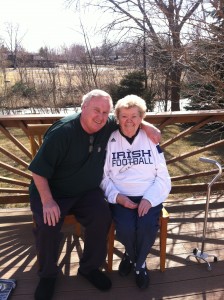
No, it’s Mike. I visit you every Monday morning.
Moments earlier, thinking Bethel was asleep, I quietly placed a note at her bedside table. I did not wish to awaken her as she had not been well my last few visits. Bethel surprisingly opened her bright hazel eyes (striking in contrast to her dark brown skin) and whispered her guardian angel question.
“I was visiting my grandmother. I was dancing with my husband, talked to my twin sister” whispered the 96 year-old increasingly frail, child-sized person. (Her twin sister Ethel had died at age 12). “My children were all there with my other brothers and sisters…My grandmother had just told me that I couldn’t stay with them today…. that a guardian angel would soon meet me and he would bring me to them to heaven forever…So, are you my guardian angel?….Yes, you must be my guardian angel.”
It occurred to me that I was wearing a light blue and white hat and jacket and with my white hair possibly I looked something like a celestial blue, light-haired, storybook aging angel to a 96 year-old lady. Bethel grew up in a family of sharecroppers in the Mississippi Delta before they moved to Chicago during the Southern exodus north to cities like Chicago after World War I. Maybe because of our white-only media messages and Southern country church cultures, angels are thought to be Caucasian personages with white robes and wings enhanced by blue skies.
I first met Bethel last December. When introduced by the Little Brothers Friends of the Elderly, Bethel glared up and me and clearly pronounced to the whole cafeteria at Applewood Nursing Home, “So what is this white guy gonna do for me?” I laughed (joining the cafeteria’s audience) and said I would be visiting her Mondays and help her if she needed anything, or just talk.
“Yeah, we’ll see” was her only response.
Not a good start. But after learning she liked easy language puzzles, I brought her a Dollar Store Bible word search book (with every page another chapter of the Old and New Testament). She also liked my weekly 69-cent Hershey bars, which she never forgot to tell me was the treat of the week. Our ritual was to talk in the cafeteria for thirty minutes and then I’d wheel her to visit the glass-encased ten pairs of birds whom she loved to startle as they flew in circles when she tapped the glass. These colorful, flying, chirping birds were by far the brightest, most free and uplifting activity and metaphor for life that a wheelchair or bed-bound elder could enjoy in the mainly gray, thick-vapor-detergent-smelling 100-bed facility.
In January, Bethel asked me why did God want to keep her alive with nearly all her loved ones dead? Not to mention the disgusting, foul food and twenty pills forced daily on her, with deaf roommates who kept televisions blaring 24/7?
Why, Mike, am I still here?
The only answer I had was, Bethel, you know how you always say it’s sad almost no one visits you and no one visits nearly all the elders here? Maybe your role in life now is to be the one person who visits and talks to all the other seniors here. That just might be a good job for you.
Bethel, hazel eyes catching mine for a few seconds, licked her lips and said, “you know what I think…..I think you’re right.”
I never knew if Bethel talked more to other elders after that. But she momentarily presented a sense of conviction that she would do it.
The last three visits (all in one week) she did not speak nor was she awake much. At our last visit, I spoke to Bethel and she just stared out—not focusing. I tried to make eye contact with her by moving my head up, down and sideways but she did not blink for the full 20 minutes I talked to her. I repeated her favorite stories like Bethel on that safari-church pilgrimage to Africa you were the most beautiful woman there and all the native men wanted to marry you. The native women were jealous and wanted you to leave the party but you stayed and danced with all the men. You could have married any one of those men including the chief. You really loved those birds and always wanted to see them fly throughout the facility freed from their glass cage. Good thing they never gave you the birdcage key you kept asking to look at for just a few minutes. You just wanted those birds to be free for once.
Finally, I touched Bethel’s childlike forearm and said that it is okay if you want to visit your grandmother. I’ll come back Wednesday but if you’ve already left that is okay. (I wasn’t sure Bethel heard me although the nurse thought Bethel could.) Bethel, it is okay if you close your eyes and go to sleep. Her eyes closed. It was the last time I saw those bright hazel eyes.
Later that week, I was wondering how Bethel was doing as I parked my car in Hyde Park on the way to Fr. Jim Vorwoldt’s residence for our monthly reflection meeting. As I walked on the half-shoveled, icy sidewalk I was looking down for slippery spots when I saw and picked-up a small silver locket and chain. It was half-heart shaped, one-inch tall with “Friends” printed across the heart.
After the reflection meeting, I stopped in at Applewood to visit Bethel. I asked the nurse, Kara, how Bethel was doing. She responded that Bethel had passed on March 2 in the early afternoon. I had left Bethel about 11 a.m. that day so I felt fortunate to have talked with her in her last hours.
That night I told my wife, Janice, about Bethel’s death and the coincidence of finding the half-heart “Friends” locket earlier that day. Jan said the other half of the locket must belong to someone else, who is a friend. Jan, in her wisdom, could not have said anything more meaningful for me on behalf of my new friend, Bethel.
